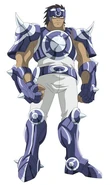The Boötes Cloths is one of Silver Cloths.
Myth[]
Boötes is traditionally depicted as a herdsman with two hunting dogs on a leash and a club in his other hand. In the sky, Boötes follows Ursa Major around the pole. In one story, the constellation represents a ploughman driving the oxen in the Ursa Major constellation, followed by his two dogs, Asterion and Chara (represented by the constellation Canes Venatici, the Hunting Dogs). The ploughman’s oxen are tied to the polar axis and their movement keeps the skies in constant rotation
Most commonly, Boötes is taken to represent Arcas, son of Zeus and Callisto, daughter of the Arcadian king Lycaon. Arcas was brought up by his grandfather, the king, who one day decided to test Zeus by serving him his own son for a meal. Zeus, however, saw through Lycaon’s intentions, transformed the cruel king into a wolf, killed all his sons with thunderbolts, and brought Arcas back to life.
Zeus’ wife Hera, having heard of her husband’s infidelity, transformed Callisto into a bear. Callisto roamed the woods until, years later, she met her son, who was now grown up. Arcas didn’t recognize his mother and began to chase her. Callisto hid herself in a temple, where he could not hurt her without risking being convicted to death for defiling a sacred place. To avoid a tragedy, Zeus placed both of them in the sky; Callisto as Ursa Major and Arcas as Boötes.
In another story, Boötes is taken to represent Icarius, a grape grower who once invited Dionysus to visit his vineyards. The god was so impressed that he gave Icarius the secret of making wine. Icarius followed the recipe and enjoyed the beverage so much that he invited all his friends to try it. They, however, enjoyed it a bit too much and, when they woke up the next day with bad hangovers, they assumed Icarius had tried to poison them. Angry, they decided to murder him in his sleep. Dionysus was saddened by the death of his friend and decided to place Icarius among the stars.
In another myth, Boötes is credited for inventing the plough, which prompted the goddess Ceres to place him in the heavens.
Notes[]
- In TLC his rank is unknown, but its color suggests that it is a Bronze Cloths.

